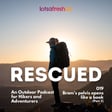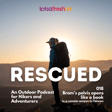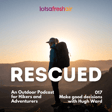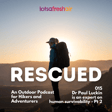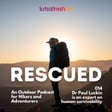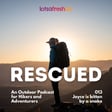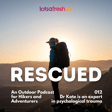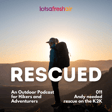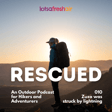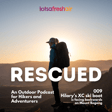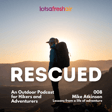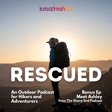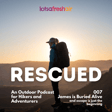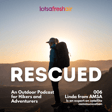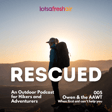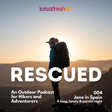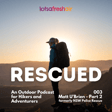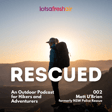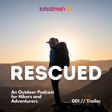Become a Creator today!Start creating today - Share your story with the world!
Start for free
00:00:00
00:00:01

016 // Macca is broken in a big wall fall
It was the ABC News that first alerted the outdoors community to Macca's big wall fall near Blackheath in the Blue Mountains of New South Wales. With over 30 years climbing under his belt, including many first ascents and stories, some of which are the stuff of legend, he is one of the Blue Mountains climbing community's most well-known characters.
Five years on from the accident, he joins me today with Sergeant Dal Atkinson, the team leader of Blue Mountains Police Rescue Squad, to speak about what happened and what the challenges of location, access, and weather made this one of the longest and most difficult cliff rescues in New South Wales.
Transcript
Content Warning: Traumatic Injuries
00:00:00
Speaker
This episode contains descriptions of some fairly traumatic injuries, which, if you're a bit squeamish, might not be for you or for sensitive ears who could be listening.
Introduction to 'Rescued' Podcast
00:00:13
Speaker
Rescued is a podcast of conversations with rescuers and those who've been rescued. It's about the lessons we learn about ourselves, the places we go and why, without judgment or shame, to help us have better adventures, manage risk and deal with the unexpected.
Macca's Climbing Accident Story
00:00:34
Speaker
It was the ABC News that first alerted the outdoors community to Macca's Big Wall Fall near Blackheath in the Blue Mountains of New South Wales. With over 30 years climbing under his belt, including many first ascents and stories, some of which are the stuff of legend, he is one of the Blue Mountains climbing community's most well-known characters.
00:00:56
Speaker
Five years on from the accident, he joins me today with Sergeant Dale Atkinson, the team leader of Blue Mountains Police Rescue Squad, to speak about what happened and what the challenges of location, access and weather made this one of the longest and most difficult cliff rescues in New South Wales.
00:01:14
Speaker
So guys, i want to thank you both so much for being a part of this episode of Rescued. And it's going to be one of the special types of episodes where it's not just one person's perspective of an incident and what happened, but we actually get two different sides of a perspective. And these perspectives are really important. So with me in the room today, we have Makaisa, that's Maka, who's going to talk about something that happened to him about five years ago in May 2020.
Sergeant Dale Atkinson's Role in the Rescue
00:01:46
Speaker
And in the room, we've also got Sergeant Dal Atkinson. So i might get Dal, if you wouldn't mind just introducing yourself briefly to get some background on your role and the role that you played in this incident.
00:02:01
Speaker
So Dale Atkinson, I'm the team leader of um the rescue team, the police rescue team up here in the Blue Mountains. Been doing it for almost 18 years. Certainly not the team leader for that whole time.
00:02:12
Speaker
So our day-to-day role is we coordinate and perform all the remote area search and rescue incidents in the Blue Mountains and surrounds. And also we're the accredited vertical rescue agency for the Blue Mountains local government area.
00:02:26
Speaker
i was on shift when the call for MACA came in and subsequently led the rescue operation from the police rescue perspective. And I was one of the guys that spent almost 24 hours down on that cliff with MACA.
00:02:43
Speaker
Let's fill in the story a bit from your perspective, Macca, and tell us a little bit about who Macca is. So um give us an an understanding ah of how did you, i think from an outdoors perspective, how did you first fall in love with the bush and spending time in these places?
Macca's Climbing Experience and Safety Evolution
00:03:02
Speaker
Well, I guess I was a ah typical child of the seventy s did cubs, scouts, venturers. We did go out and go climbing and canoeing and caving and all sorts of stuff like that.
00:03:20
Speaker
The equipment of the day was essentially... a diaper harness made from a bit of seat belt material which in our case was cut out of a dumped car, two stew-by-steel crossed beaners, horse-allayed three-strand rope, army pants were the regular sort of fashion and I guess standing at the top it was like, you know, oh so is this dangerous? And I was like, well yeah, you'll
00:03:53
Speaker
bloody die, you know, if you stuff up, and which I think is a major contrast to today where it's like, you know, top the delay, mega safe and you're at the top and your instructor, you know, ah is this dangerous? And it's like, no, it's perfectly safe. And essentially it is. But, I mean, I grew up knowing That stuff was dangerous.
00:04:21
Speaker
I gave up rock climbing, got into social activism for 10 years during the 80s and then got back in into climbing in the early 90s with kids when I'd moved to the western suburbs and the local gym had opened up.
00:04:38
Speaker
was sort of like, oh, yeah, I used to do that. the The challenge, the the working out of a problem for you, For mental health, it's also a place in which you can be focused in the now.
00:04:57
Speaker
ah You can forget anything else that's going on in your life, and so it can provide you know ah a welcome or a spite from you know society.
Adventure Climbing: Thrill vs. Risk
00:05:07
Speaker
I guess I then got into adventuresome climbing as a preference um because, again, it just makes the the now...
00:05:17
Speaker
so much more visceral and engaging. Adventure climbing can be a lot of things from just sort of easy stuff that has exposure and so it's a more sort of general feeling of engagement with what's going on in that you've really got to pay attention.
00:05:40
Speaker
Think of some of, you know, a steep climb out from a canyon perhaps where you know, you've got to pay attention and you're engaged, but you still have safety.
00:05:53
Speaker
But then there's also stuff where, you know, yes, you want to push the envelope, you know, and now we're talking about stuff where it's no longer, you know, it's it's a vertical or past vertical.
00:06:08
Speaker
So you're really hanging on and there's consequence to what can happen. can Can I ask you about a quote that I've heard you use in the past, the Edward Wimper quote, the climb, if you will?
00:06:24
Speaker
Climb, if you will. But remember... that courage and strength are naught without prudence and that a momentary negligence may destroy the happiness of a lifetime.
00:06:39
Speaker
Do nothing in haste. Look well to each step and from the beginning think what may be the end. Are you able to give me a really simple explanation of what is it that climbing these days with all the um equipment that's have what would be a good response to say to someone who thought oh all climbing is stupid and any any time you step off a cliff or try and go up one is is stupid what would you say to them well climbing has a ah very wide gamut of activities first you can choose a climb that's safe
00:07:20
Speaker
um It's like choosing to walk up a set of good stairs rather than walking up a steep path. That's yourself as protection, where you make the decision as to how safe you are, whether you choose to climb something or not, whether you choose to take that next move or not.
00:07:42
Speaker
Then As you're climbing, you can you you're using a rope which protects you if you fall. You place pieces of gear which can either be traditional gear that's placed in cracks and crevices or, in the case of sport climbing, a bolt.
00:08:02
Speaker
You can choose climbs that are safely bolted You can choose climbs that are safely protectable with natural equipment.
00:08:15
Speaker
If you're climbing a crack that goes all the way up a cliff, you can essentially put a piece of gear every move just above you and essentially...
00:08:31
Speaker
have the rope above you the whole time. So imagine you're walking up a set of stairs with a handrail next to you and you can clip a rope in all the way up.
00:08:44
Speaker
Now imagine that The stairs you're walking up are really very difficult and a bit slippery and quite steep like a ladder and you're likely to slip off.
00:08:56
Speaker
Then the places where you can connect your safety onto the rail become less and less. So your option of falling becomes further and further.
The Fall: Macca's Injury Details
00:09:09
Speaker
Essentially, you will fall twice as far as you are from the last point of protection plus a little bit so let's take take a journey back to may 2020 and this day that we're talking about now what do you remember of the day
00:09:32
Speaker
I had already been doing a bunch of climbing up the far end of Carnwall, so below Point Pilcher Lookout. Did some really nice stuff there, a 200 metre first ascent.
00:09:46
Speaker
It looked pretty interesting, highly unlikely that anyone else had ever looked at it, which is always a good point. The first pitch looked really good, so we decided to do that.
00:09:59
Speaker
Zach climbed Hugh Pogbaugh. followed. Then I climbed it and it was quite good and it was well within my ability. So when the option was given to start up the next section, which was 60, 70 metres,
00:10:15
Speaker
and so I started off up a crack line, which ended up being quite dirty. They looked like an option going on to a slabbier section with less protection. So I headed out there, found some gear, looked up, saw some more gear, went across to that, got a pretty good wiring, not where I thought it was, but in a novel placement, climbed up to it.
00:10:42
Speaker
Stance was good, but The gear required me to do one more move. so before you tell me about that one more move, can you explain what you mean by protection and gear?
00:10:57
Speaker
For those of us who who aren't climbers and don't understand, um especially this form like trad climbing. Okay, well, there's various equipment from small bits of metal that you can jam into a crack in the rock.
00:11:14
Speaker
Imagine a bat a strap of a bag getting caught in the V slot of a branch and it stops your pack moving. So that's essentially what basic trad gear is.
00:11:26
Speaker
Equipment that you can put into the rock and connect your rope to so that if you fall, that will hold you. And so you'll only fall twice as far as you are above that.
00:11:41
Speaker
Yeah. So talk to me about this one last move that you had to make. but Basically, I'm at a quite good stance. I look down. Yes, I'm well above my gear. No, that doesn't change the equation of the difficulty of the next move.
00:12:01
Speaker
It only changes the consequence. And to this day, I haven't worked out what happened. I've tried Half a dozen times to walk in, managed to get onto the cliff two or three times to try and get down to the exact location.
00:12:17
Speaker
Never quite made it to the right spot yet to try and redo the move. So I... Realise I'm falling. Apparently I called falling quite calmly, obviously just in pure instinctual reaction because it takes a long time to actually realise that you're falling. It's like 200 milliseconds average sort of reaction time and all of that.
00:12:45
Speaker
So realise I'm falling. I've called falling. I can recall... head spinning and I see the like the guys are just like a flash of colour in that initial thought as I look down, as I swing the vision, look down between the legs, see nothing but rock below me.
00:13:04
Speaker
As that's happening, my first thought is ah, my right leg's out of the way because I'm angled to the cliff. I've got a ah dodgy right knee. so it was sort of like right leg's out of the way. That's good.
00:13:20
Speaker
look down between my legs, see nothing but rock. Oh, this might not work out very well. Next thought was think of something. What can you do to improve the situation?
00:13:35
Speaker
Then a final impassioned do something before I crashed and tumbled. I don't know if I tried to push off in the last moment and that's what contributed to the wrist injury.
00:13:52
Speaker
If I'd known that it was that much stuff below me, I might have tried to push out further to avoid dropping straight onto it. I guess I didn't judge what was below me properly during my smelling the roses.
00:14:10
Speaker
So what impacted the ground first? Not sure, though I suspect that potentially my left foot So I'm angled left side towards the cliff.
00:14:23
Speaker
but Outside of my left foot has hit the wall. That's what's caused my ankle to turn outwards. That's popped my talus, the ankle bone, out of its normal position and stuck it out through the inside.
00:14:43
Speaker
and then the other leg has impacted more directly and majorly broken. I've essentially come to a stop half upside down, looked up at my right leg.
00:14:58
Speaker
There's hole the size of three or four finger width or length by two finger width, hole sticking out of my right leg.
00:15:13
Speaker
My right ankle is, or foot, is flopping around like a fish. um My response to that was, okay, that's not good.
00:15:23
Speaker
ah Go to grab it. Left wrist explodes in pain and seizes up. I think somewhere there it was hitting a nerve that was just giving intense pain.
00:15:37
Speaker
Behind my wrist, my left ankle comes into view and there's a bone sticking out of it and I'm like, I've got no idea what that bone is. Yeah. except that it's not supposed to be sticking out.
00:15:51
Speaker
And all of this is happening in split seconds? Yeah, that's that's happened within, you know, a split second, those thoughts. um I write myself.
00:16:04
Speaker
I basically do a ah second triage. Right leg is broken beyond use. Left foot is broken potentially beyond use. Left wrist is beyond use uh we can't go up we can't do this you know basically played out a whole bunch of scenarios in my head of how i could get myself out of the situation just with the couple of us um it was sort like nah can't put the guys through the experience of dragging me out in intense pain
00:16:42
Speaker
So did you land with your mates? No, so I'm still on road, about 10 metres above the ledge there on and maybe five, several metres to the left.
00:16:58
Speaker
And how far did you fall? 10 metres plus, we estimate. We began responding to Point Pilcher lookout at the back of Medlow Bath.
Initial Rescue Operations
00:17:09
Speaker
When I got out there, there were some already some ambulance resources that had not long arrived. Over the the next you know few minutes, ah my off-sider and other ambulance resources turned up.
00:17:22
Speaker
Given the time of day and and obviously the time of year, we didn't have a lot of daylight left. So the decision I made the decision to to put a drone up and see if we could get eyes on and at least get some more information about where Macca was and and you know um how we might attack it.
00:17:41
Speaker
He was about a kilometre around the corner from where um from the car park at Point Pilcher or the lookout. They were about 60 metres or Macca was about 60 metres from the top of the cliff on a small ledge.
00:17:54
Speaker
For us, up particularly up here in the Blue Mountains where help is generally at the top of the hill, not the bottom, um it's always the yeah the ideal scenario, particularly with a stretcher ah stretch a patient, is to bring them back up because that's going to be usually the quickest way of them getting getting off to hospital.
00:18:13
Speaker
I suppose the one thing we did have have on our side at that point was the fact that it was, what, less than six months after the the devastating 2019 bushfires and that particular area had been burnt quite significantly.
00:18:29
Speaker
So there wasn't a lot of vegetation um around which actually went against us a bit later on in the story but ambulance helicopter arrived on scene and we were able to sort of you know pretty quickly direct them into where where where he was so they had a bit of a look and made the call pretty quickly. They weren't going to be able to insert a paramedic straight down to where MACA was. It was, you know, it's ah pretty much a ah vertical wall there and they they just would have had the clearance to be able to um to safely insert down the wire ah a paramedic.
00:19:04
Speaker
what What happens next? What are the next decisions and how you communicate with you know, with ambulance and try and approach what do we do now?
00:19:15
Speaker
Yep, so we, I mean, obviously we're we're staged at the car park with an ambulance forward commander, um special operations paramedics. We've got direct communications with the helicopter and, the you know, the paramedics on board the helo.
00:19:29
Speaker
They decided they were actually going to insert um the two critical care paramedics onto a ridge near the top of the cliff where Macca was. And they were going to take some gear down.
00:19:41
Speaker
Again, knowing that they they were potentially going to be able to get access, the the helicopter paramedics, but probably wouldn't have the gear or the personnel to be able to move MACA very
Coping with Pain and Waiting for Rescue
00:19:54
Speaker
far.
00:19:54
Speaker
um We started planning our approach to getting both us and and equipment into the top of the cliff with the view of um performing the extraction. So thinking forward that the the two critical care paramedics had gone down accessed UMACA, can you tell me what was it like when he first arrived and what do you remember of that moment?
00:20:22
Speaker
Well, basically remember all of it quite clearly. I've been sitting there, you know, there is discussion of what they're going to do, um Oh, they can't do this, they'll do that, like blah, blah, blah. I wasn't interested in any of it.
00:20:38
Speaker
I knew that they would do whatever they did. I guess I secretly hoped that they'd just swing a long line in and winch me off. and It had gotten dark.
00:20:49
Speaker
um I was pretty much in my own world, just sitting there, looking at my legs and trying to stop them grinding. So what was the pain, like in terms of your pain level throughout this period? Like I just can't even imagine.
00:21:06
Speaker
Well, i guess ah in part that's the good thing. So in there were two things that bothered me the most. um My wrist, because if I moved it at all, it would hit a nerve and just give that nerve electric shock that makes your whole arm sort of go and so I kind of had to keep that protected the pain from the feet was so over the top that it was just sensation I'd previously had an incident with sciatica where I'd been able to differentiate you know nerve pain that is essentially fake it's just a nerve being twinged your legs aren't actually injured
00:21:53
Speaker
And so I kind of learnt to deal with the pain by going, okay, that's not real pain. Interesting. That's just nerve pain because it would feel like my leg was massively cramping, but I'd feel it and it would be fully relaxed.
00:22:11
Speaker
When I initially got lowered down, my legs were sort of draped over a rock and I couldn't see them. at first, and that was sort of the worst bit because it felt like they were blowing in the breeze.
00:22:24
Speaker
So from that initial position after initially just going, ah, thank God I'm sitting down, there was just most fortunately this sort of seat-type boulder directly under me. So that was that lowering you down off because you were still on rope, as you said, when you'd when you'd fallen. So this was to get you down from that rope onto something solid but still attached.
00:22:48
Speaker
Yeah. ah Going back, basically I'd said, guys, call EVAC, call Triple O, I need EVAC. They're like, nah, you're fine, you know, you're okay.
00:23:01
Speaker
ah Literally just wobbled the leg at them and went, nah, broken both my legs. What do you want to do? There's not much I can do.
00:23:12
Speaker
I can't reach the rope in any way to get back to them. And it's like just lowering me back down level with you. And fortunately, there was this perfect seat over a boulder.
00:23:24
Speaker
Sat there, relaxed for a little bit, realised that the feet weren't going to handle that, picked my legs up, spun them around sort of 45 degree to the cliff so I could sort of look at them.
00:23:37
Speaker
Okay, I've got bleeding going on, wiggle your toes. ah You wiggle your toes for frostbite, you know, if you're mountaineering because it keeps blood flowing.
00:23:50
Speaker
So maybe if I wiggle my toes, it'll keep blood flowing through my feet and that'll help. Can't wiggle my left toes. They really hurt. My left shoe's really, really tight.
00:24:04
Speaker
Is it because I can't wiggle my toes or is it just because my shoes are tight? And that was just really painful. Sitting there, fully dark. what Well, speaking of the dark, like what what time of day did the accident happen?
00:24:21
Speaker
Probably quarter to four. So basically I i fell. I triaged myself when I'm stuffed, called triple o ah guess they they'd lowered me back down. What do you want to do Lowered me back down, took several calls to get through.
00:24:39
Speaker
what was that time waiting like? can you What was going through your mind? that i ah need to hang on till they get here and then I need to hang on till we get to the hospital because it doesn't end once the rescue people get there. and There's too many incidences of people giving up once rescues arrive. Basically, I accepted what was going on.
00:25:10
Speaker
Simply had to wait and wait. Went into my own bubble. What was that, your own bubble? Can you explain mentally where you went in that time?
00:25:21
Speaker
ah Well, it's just that that whole thing of making sure my leg didn't sort of grind. I couldn't think about um Hugh, who was on the ledge with me.
00:25:34
Speaker
had a bit of a vomit with absolutely no energy to move, basically in the dark, and basically all I knew is that I needed to just wait, hang on, and the help was going to arrive.
00:25:49
Speaker
What's the size? How wide is this ledge that you're all, so all three of you are on this spot at the moment and then this fourth person from ambulance comes down?
00:26:01
Speaker
Basically, the the ledge is not much more than a metre wide. To the left of me, towards Point Pilcher, it gets a bit wider. There's a tree where the belay is, and then it's five or six metres or more over to where I am. I'm sitting on a bit of a boulder, fortunately, that gives me a seated position.
00:26:23
Speaker
The bit between me is quite clear. little bit of dirt and greenery where I am. It maybe gets a little bit wider, but not much. Suddenly out of the darkness, the paramedic appears hanging on his rope.
00:26:38
Speaker
Hi, I'm Luke. I'm like, hi, I'm Macca. I really need to get my shoes off. This episode of the Rescue Podcast is proudly brought to you by the good folk at Blue Mountains Climbing School who are passionate climbers, canyoners and bushwalkers dedicated to teaching the kind of skills that enable outdoorsy types, that's, you know, people like you and me, to safely and responsibly undertake our favourite activities and to get out in wild places.
00:27:11
Speaker
With some of the best guides in Australia and one or two volunteer rescuers on the team, they not only know what to teach, but how to teach it in really practical, effective and engaging ways.
00:27:23
Speaker
So if you've been thinking of sharpening your skills in you climbing, canyoning or bushwalking, check them out at climbingschool.com.au.
00:27:34
Speaker
So, Del, what information, what comes back up to you from your colleagues in Ambulance NSW who are halfway up this really big wall with MACA in the dark now?
00:27:47
Speaker
And what time year is this too? what what What kind of weather conditions and temperature It was mid-May. It was a cool night. I wouldn't say it was a cold night for the Blue Mountains. Perhaps yeah people from the lowlands would consider it to be a cold night, but I think it was mid-single digits. But, yeah, so luke Luke went down and gave a report that...
00:28:08
Speaker
Obviously, you Maka had sustained some pretty significant lower leg injuries and and the the wrist as well. And he certainly wasn't, you know, he was going to have to go into a stretcher. And and from a clinical perspective, there was a few things were going to have to kind of happen where where that was concerned. So, you know, we've got a plan to be there for some time, you know, have enough gear to to to ensure our survival as well as MACAs, you know, wet weather gear, overnight gear, food and water, additional roping equipment, so enough rope but also the hardware that's going to be required potentially to move MACA. So all that has got to get down to that site.
00:28:44
Speaker
So I couldn't tell you, you know, who took exactly what, but we had a number of lines. I think we ended up with three three separate 200 metre ropes anchored from the top and as Macca said before everything we done on that ledge we had to be attached to something you know we had to be attached to a safety because it's only it's only you know less than a metre wide and below that's another you know upwards of 100 metre drop.
00:29:09
Speaker
And when real estate is that limited not only the the number of people you've got on the ledge, but the bulk of the gear, but also the weight and how, you know, everything you move probably affects something else that's either attached to it or, you know, balanced against it or something like
Rescue Preparation and Execution
00:29:28
Speaker
that.
00:29:28
Speaker
Yeah, no, absolutely. I mean, they're all things that have to be taken into consideration. So from memory, we set up like a ah like a traverse line, a safety line on yeah horizontally across that ledge.
00:29:39
Speaker
so that we we weren't all you know tripping over each other and and hanging off the same ropes. I guess good fortune, um there was a a small gum tree, I think it was ah a eucalypt from memory, growing on this ledge. It was a couple of meters around, you know along the ledge from where Mac was positioned.
00:29:58
Speaker
But what we were able to do is use that as a Rubile anchor to set up for the next stage, which once Macca was in the stretcher um and we were ready to start moving down because there was no point of sitting, you know, staying at that ledge. You know, we could have sat there all night. We knew the helicopter wasn't going to be able to get us from there the next morning.
00:30:15
Speaker
Going up at that point wasn't an option. So, you know, Like any of these jobs, um you know, you've got plan A, B, C. Sometimes that changes, you know, either the the plan changes completely or or just details within the plan change.
00:30:31
Speaker
But we're always working towards the end goal and that's to get him out of there. So with the... You know, the most viable option being to go down. not Notwithstanding, we didn't know what were going to find when we went down, but um to go down, we started setting up for that.
00:30:45
Speaker
So we set up a re-blay anchor off this tree. And I don't think Shell spent a lot of time on on that ledge with us. So I said to Shell, listen, can you can you descend down and just see what you find? she And, I mean, as I said, by this stage it's probably midnight, you know, very, very close to.
00:31:03
Speaker
And she had no idea what she was going to come across when she got down there. Well, it sounds like up to that point, Mackie, you're being an incredibly um compliant and helpful patient who has just suffered an immense physical trauma yeah and I can't imagine what's going through in your mind how did you keep your cool well there was a very limited number of things that I could do when Libby got down the stretcher just happened to fit perfectly
00:31:37
Speaker
on the ledge, just wide enough, just long enough. She couldn't come across. So she held the far end of it. um Luke, who's fortunately quite tall and, you know, all of that, he's on rope just in front of me.
00:31:54
Speaker
I'm still on tight rope from the belay. i think Hugh probably pulled on that. i was like, you know, i look, I moved my legs before. I'd much rather deal with them than have someone else deal with them.
00:32:09
Speaker
So Luke basically just grabbed me from the harness and lifted me up. I grabbed my legs and threw them at the far end of the litter and then I was in the litter.
00:32:26
Speaker
and everything was good. And everything was good. Yeah, ah well, everything had improved. Then Dal got down and it was sort of like, ah, hi, Dal. Sorry about the ah problem.
00:32:39
Speaker
That's the thing about the small communities, isn't it? People know each other. Yeah, and then everything got better because it was sort of like, I know Dal, and it's sort of like, then it was sort like, good, I don't have to worry about getting myself out.
00:32:52
Speaker
I'm his problem now. By the time you got down to this ledge, can we give the ledge a name? like ah the The Taj Mahal. The Taj Mahal.
00:33:03
Speaker
Was what Luke and Libby named it. Excellent. So the Taj Mahal, this incredible little overhang, it was just two from police rescue, is that right?
00:33:14
Speaker
Two from ambulance and Maka. And then Maka, your two friends had or were it soon to depart. Yeah, Zach had been at the top. He was staying with the paramedics and was sort of obliged to stay with them. But then once it started getting drizzly and they didn't have enough jackets and all of that, he just kind of went, bugger this, I'm walking back.
00:33:38
Speaker
I've walked in. Don't stop me. But you don't remember any of this, do you? no say No, once I got slid into the Taj Mahal, I then started coming out of the dissociative state that they'd had me in.
00:33:52
Speaker
So my my first recollection at the Taj Mahal is this black thing being slid over the top of me. And that was you being slid into the slot. Yeah, right. You slid in and me just going, oh no, I'm not dead. Yeah.
00:34:08
Speaker
And then it was sort of like, oh, okay, this is really weird. I can see legs walking in front of me because I'm like tripping on the ketamine.
00:34:19
Speaker
My brain's trying to make sense of stuff. And so these discombobulated bodies walking around are quite entertaining. I basically told a whole bunch of stories about So were you in pain at this point? Like if you're able to tell stories and be, you know, a somewhat helpful and entertaining patient, were you in pain?
00:34:41
Speaker
No, not really because I'm majorly dosed up on, you know, a good dose of morphine um and a whole bunch of ketamines. So if if anything, I'm tripping balls, as they say.
00:34:55
Speaker
And it's like extremely difficult to try and actually like keep a cohesive speech going together. um But it was also fun, you know.
00:35:06
Speaker
This is a very unusual description of the word fun, Macca, which is not one i you you know I've not previously ah become aware of. Well, it's always good to tell war stories and I know that you know paramedics and all that enjoy that sort of stuff. Let's just look at that.
00:35:24
Speaker
So I'm going to go to the person who was um not tripping out on drugs at that point and say, Dale, what time of night? And I actually just want to ask about the timing here because if you got this call at like four-ish in an afternoon, thinking of police shift times, this is turning into a ah very, very long day for everybody, isn't it?
00:35:49
Speaker
Yeah, so I can't speak on behalf of the Ambos. I'm not sure what shifts they were on that day, but certainly Vachelle and I, we we started work at 8 o'clock on the Sunday morning. we're We're now in the wee hours of Monday morning. Yeah, so by the time we got everyone down to that that ledge um where we could we could relax a little bit, once once you were sort of tucked into the cave, you're actually able to come off rope.
00:36:14
Speaker
So that was that was pushing about 4 a.m., So I've got so many questions about that. And the first one is how you manage fatigue when you are working in an environment that doesn't play well with fatigue and working in a situation where, you know, how do you how do you look after each other? How do you look after yourself? How do you just stay on point?
00:36:39
Speaker
Yeah, look, you've you've certainly you've got to be self-aware of where you're at in terms of fatigue and and also and we we always brief on this stuff. Like throughout a ah protracted job, um we always check in with each other and it it just goes without saying that, you know, it's everybody's responsibility to watch self but also the rest of the team and look for signs of of that decline.
00:37:05
Speaker
Honestly, when when you're engaged in a job like this, though, fatigue in a lot of ways doesn't occur because you you just you're so both physically but mentally active.
00:37:16
Speaker
As soon as you stop, that's when you realise, oh, I'm tired now. But to that point, I mean, it's ah it's a serious business. Like, you know, yeah we're we're working on a 200-metre cliff, you know, with very limited real estate, all the gear.
00:37:32
Speaker
um you've you You've just you've just got to yeah you've got to be on point constantly and be on the lookout for each other. A strange question I've got is given the size of the real estate you've got and it's a long period of time, just like I'm thinking how do you like even toilet?
00:37:50
Speaker
How do you even like get that kind of like know your teammates pretty well to get on with each other but it sounds like you've actually really got to go, you know what, this is just about getting the job done.
00:38:01
Speaker
Look, again, that's just part of working with a small team in this sort of environment. You know, it's a pretty clear memory in my mind of Libby hanging onto my leg with one hand while she relieved herself. You just got to take what comes. so You do what you have to do. Yeah, that's the reality of it.
00:38:18
Speaker
You know, unless you're absolutely busting to go, you don't even think about that. um So going 12 hours without taking a leak is, but it's just, it is what it is. Don't know if that's physiologically the best thing, but keeps you stay on on point to the job? There were times for me where i was sort of quite thirsty and, you know, they sort of, you know, they gave me some water and then at other times it was sort of like, oh, we we haven't got much, we've got to stretch it
Resource Management and Pain Challenges
00:38:46
Speaker
out. And I'm sort of like, oh, yeah, okay, I guess that's fair enough. And, you know, thinking back, it's sort of like, well,
00:38:55
Speaker
Actually, they would have had plenty of water, but they were managing my hydration. But at the time, it was sort of like, oh, can I get a drink? Oh, we've got to make it last sort of thing. And it's sort of like, oh, okay.
00:39:09
Speaker
That's a very accurate assessment, Macca, is, yeah, it wasn't due to a lack of water. It was very, very much managing your needs. My recollection, I mean, I didn't actually get to sleep. I don't know if anyone else did. We certainly all went very quiet for a while.
00:39:25
Speaker
And coming back to the whole pain thing, so during most of that storytelling time, you know, I'm just tripping balls and managing to speak and my body just feels fantastic.
00:39:38
Speaker
As it all started wearing off, the pain started ramping up quite a bit and I was simply trying to stay quiet.
00:39:50
Speaker
I didn't want to. was sort of like, okay, I don't want to wake them up. They're having a rest um and then ultimately I think Libby heard me groaning and was sort of like, Luke, Luke.
00:40:05
Speaker
Top him up. Yeah, what's wrong with Macca? It's just all starting to hurt a bit. Didn't want to bother you. I'm wondering if they wish all your their patients were like you, Macca.
00:40:16
Speaker
Well, they in the presentations they've given and all of that, they said I was quite fantastic but ah guy to me, It's like, well, but what else could you be?
00:40:28
Speaker
and ah guess you could be a complete a-hole and go, get me out of here. Get me. Why aren't you doing something? Get me. And be complete.
00:40:41
Speaker
That's not going to achieve anything. But I think something that I have heard from some of the presentations that i read and watched in preparation for this was that you were incredibly grateful.
00:40:54
Speaker
And when you think about how lucky, how absolutely lucky we are to live in a country and in a situation where these services and this support for us as you know as a community is available um mean i yeah i find it challenging and i guess i've got to try and think why anyone would have any other response other than one of sheer gratitude to find themselves with you know the kind of yeah the kind of help that is afforded to us in in australia You're dead right, Caro. And look, Macca's right in a sense that not not all patients have
00:41:35
Speaker
realistic expectations and expectation management is a challenge sometimes. i think I think the thing that sets Macca apart from from some other situations is to do what Macca does and let's not let's not lose sight of the fact that these guys were out climbing in an area that was pretty well uncharted.
00:41:55
Speaker
They're not just knock about um knock about come up to the the mountains every, you know, one weekend every couple of months and do some sports routes at one of the easy access areas. Like, they're out in the middle of nowhere doing what what no one's probably done before.
00:42:12
Speaker
With that comes a lot of resilience and an attitude that if I get into trouble out here, I know it's not going to be good. And doing that, and I'm sure Macca will add to this, but when you've done that sort of recreational activity in that context for as long as Macca has,
00:42:32
Speaker
any Any response to his predicament that that night would have been a positive for him. So I think if it was if it was someone who wasn't ah accustomed to being uncomfortable and in a remote area, as Macca is, then the attitude might have been different. But I think, yeah, I think that sort of plays into it, is Macca's a bit of a unique individual by virtue of his story, by virtue of who he is and what he does when he's out there on these big walls in the middle of nowhere. I i was actually ah a bit disappointed, I guess, that um we couldn't self-rescue or rather that we could have self-rescued.
00:43:11
Speaker
If we'd been somewhere really remote that rescue wasn't an option, then it would have just been and a good challenge to get myself up the cliff or out.
00:43:21
Speaker
Just another problem to solve. Yeah, but instead it was just sort of like, Nah, having those rescue services available, now is the time to call. It was like, not it don't even wait. yeah Like once it's happened, it's sort like, this is bad enough, I need rescue, we called.
00:43:46
Speaker
um And then, you know, everything that follows, it's sort of like, that's what has to be done, that's what has to be done.
00:43:56
Speaker
So the sun rises after a ah long night. what What are the decisions and what's happening at first light?
Weather Challenges for Helicopter Extraction
00:44:06
Speaker
Once daylight broke, um we were unfortunately met with ah certainly we we couldn't see what was going on up the top, but we were met with a valley full of cloud and fog, and which is not ideal for winch extraction with a helicopter.
00:44:21
Speaker
But um again, you just you move forward with the plan. So we started to recce what was below. i went ah went down, look, at it was probably another 30 or so metres, to quite a big ledge.
00:44:35
Speaker
It was an interesting sort of feature because it like Like most of those claystone ledges, they they so they slope downwards, you know, at you know anything around 45 degrees. But this one also wasn't completely horizontal.
00:44:48
Speaker
It had some, a bit of a rise to it from where you... your land And from memory, there was a bit of a gully kind of off to the left, um as you know, directly below where we were um in in the the cave, as we're calling it, the Taj Mahal. So we went through the motions of facilitating that. We got Maka down to to the landing point on that ledge to begin with. Then we had to set up another system.
00:45:13
Speaker
to then physically move him um horizontally of sorts, up that bit of a rise and around the corner. So that took a little while to ah to achieve that. And it was early afternoon from memory.
00:45:26
Speaker
we We got Macca and all our gear down to the point where once we got a break in the weather, the helicopter be able to come in and and winch Macca out. And ultimately all of us, it was the plan.
00:45:40
Speaker
So another question I've got is the first I heard about this job is probably the same as so many other people in that it hit the news and there was um footage on news coverage that that was being shown of, you know, this cliff rescue that was taking place and it was, you know, taking ah an extended period of time.
00:46:05
Speaker
What was your perspective of that? Did you have knowledge or could you sense that there was anything happening outside this bubble of rescue that you were in yourselves?
00:46:17
Speaker
I certainly could. What appeared to be a news chopper came in whilst I was still conscious in the morning before we headed off.
00:46:28
Speaker
My memory, again, I get blacked out once we leave the cave. So i was I was trying to to wave at the camera crew so that my daughters could see it because basically so two of my daughters had heard it the night before.
00:46:49
Speaker
my youngest, um who was training to be a paramedic at the time, had ah her partner's mum call out, oh, there's a guy stuck on the cliff.
00:47:02
Speaker
And she's like, oh, it's probably my dad. Oh, don't say that. He's hurt really bad, broken both his legs. Yeah, that'd be something my dad would do. That sounds like that paramedic paramedic sense of humour.
00:47:18
Speaker
Do you have a personal story about an incident or time during an outdoor trip when something didn't quite go to plan? Maybe you got lost, injured, let down by some gear or something else. Look, honestly, it can happen to any of us at any time, regardless of how experienced we are.
00:47:36
Speaker
And it's by sharing these stories that we can all learn and help avoid them in the future. If that's you, I'd love to hear from you. So please drop me an email to rescued at lotsafreshair.com. That's L-O-T-S-A, freshair.com.
00:47:54
Speaker
Okay, so Dal, you've scoped out this this area which seems um doable, but it's not a simple task and it's not done quickly.
00:48:05
Speaker
No, so it took, once we decided that's where were going to aim for it, it took a ah few hours to to move Macca down there. And as I said, it sounds simple in theory, but one of the biggest challenges was actually moving him um across, once we got him down to the ledge, because gravity's on your side at that point.
00:48:24
Speaker
But we actually had a couple of lines set up above Macca, which we kind of used to pendulum him across that ledge in a couple of stages. um Again, you know there was there was only yeah there was only two people on the stretcher um essentially trying to manoeuvre it you know on this awkward sloping uphill ledge.
00:48:47
Speaker
so we So we sort of built the system to to make that as as easy and as safe as as we possibly could. Certainly, you know it was totally safe. I'm just thinking about it. It would have been late morning probably we got Maka to the spot where we were happy and then it was just a waiting game for the weather to clear.
00:49:03
Speaker
Obviously, while all this is happening and while we're working in that bubble, as you say, there's a full command post set up please you know with some representatives from both agencies.
00:49:14
Speaker
There's lots of comms backwards and forwards. We'd basically say this is our plan, these are our needs, make it happen. So we had helicopters sitting waiting for that window to come in and pick us up because we were very conscious of the fact that we might only get, if we got a window at all, it might only be, ah you know you know, a short period of time to get it done.
00:49:37
Speaker
Um, I couldn't tell you how long, but it it felt like a while we were kind of sitting there waiting, um, Once we got that that weather window for for the aircraft to come in, they came in, they put put down a new paramedic um down the wire that was going to, because we'd all all been out there by this stage, you know we'd been awake for well over 24 hours.
Helicopter Winch Rescue
00:50:00
Speaker
Wow. Notwithstanding, we probably had maybe at the most an hour of broken sleep in the Taj Mahal.
00:50:06
Speaker
they sent a fresh paramedic down to, I guess, facilitate the winch extraction of Macca. So off Macca went in the helicopter and and and on his way to hospital.
00:50:17
Speaker
Even that task was marginal, you know, the helicopter. And if you've if you've ever seen the news footage of Maka actually getting winched out, there's just fog rolling around. So the guys, certainly the guys on the aircraft, the the pilot and the aircrew person on that on that day did a remarkable job of getting in there, in that window and and getting Maka out.
00:50:38
Speaker
It was kind of a bit of a sigh of relief at that point once Maka... was up in the aircraft and the aircraft flew away, we went, okay, that's pretty much the job done. Notwithstanding, we're still still there and we're still stuck there.
00:50:51
Speaker
at this point. The weather closed in again and we weren't actually sure if we were going to get out. And I remember remember some comms with with um you know our representatives up at the command post to the effect of, well, we're going to send more people in to relieve you.
00:51:09
Speaker
and And I remember saying that there's no point. You know, even if other people come, we've got no other way of getting out. Short of abseiling another 50 or 60 metres down into the valley floor and then the several hours hike back up, you know, what was then the extremely damaged Rodriguez Pass to Evans Lookout, I said, I'd rather just spend another night here than face walking out in the state we're in, you know, both physical but also mental fatigue.
00:51:38
Speaker
As luck would have it, it was probably about an hour or so after MACA got got picked up that another window opened up and they were able to get another helicopter in and and pick the rest rest of us up.
00:51:50
Speaker
we got We got dumped off at ah an oval at Hazelbrook. They were going to take us to Blackheath, but again, the weather was that marginal, they couldn't get into Blackheath. They couldn't get into Katoomba. They basically had to skirt around it and we got dropped off at Gloria Park at Hazelbrook.
00:52:05
Speaker
I remember on the way home I got a phone call from police media saying, would you be willing to um to do a live cross to the Today Show at 8 o'clock in the morning?
00:52:18
Speaker
And I went, yeah, sure. I mean, we've been awake for what's now, you know, 30-something hours and spent, you know almost 24 hours on this cliff. And you did it?
00:52:29
Speaker
Or are you joking? Yeah, yeah. No, we did. you know, the next morning we were met with a camera in the car park at the police station and we did a live cross to the Today Show and and Sunrise. it was It was an experience.
00:52:44
Speaker
I'm thinking if that was me having to stand off in front of a camera or anybody after that experience for the last, you know, 24, 36 hours, would be sounding as incoherent as Macca trying to tell stories in the Taj Mahal.
00:52:58
Speaker
Well, I think ah think, I mean, I got home, it was it was probably about 5.30 in the afternoon I got home. um would have been in bed by 6 I probably slept for 12 or 13 hours.
00:53:10
Speaker
So come the next morning, I actually didn't feel too bad. Big question then is, what did you learn?
Personal Growth and Team Dynamics
00:53:18
Speaker
Like you said, when you spend time, you know, it working in ah in a small tight-knit team in those kind of environments and those experiences, what do you learn about yourself and what do you learn about um the job that you're doing?
00:53:32
Speaker
It's interesting in the days after reflecting on a job like that and it's not just what you learn about yourself but it's what what you learn about your teammates as well. You know, and I've got the ah utmost respect for Shell, Libby and and Luke because we we really did just work so well as a team. You know, at no point do I remember any of us, you know,
00:53:55
Speaker
losing our shit um or getting frustrated at what was happening. we we just We knew that it was gonna be a protracted, complex job and we just had to go with the flow.
00:54:06
Speaker
and And like I said before, as long as you're moving in the right direction, it doesn't matter how fast or slow you you are moving. I guess the one thing, um and Mac, I might disagree with this to some extent, but the one thing we had on our side is,
00:54:21
Speaker
Macca wasn't going to die if he spent, you know, 12 or 24 hours on that cliff. I mean, ideally we would have had him in a hospital bed as quickly as possible, and I'm sure the long-term effects of his injuries, I don't know how how much that was impacted by the time it took to get him to definitive care.
00:54:40
Speaker
But if if he was, you know, if if he was suffering life-threatening injuries and and it was time-critical, you know, it's it's ah It's an interesting thought experiment as to whether we would have or could have done anything different. Certainly, you know, in 2025, we've got more advanced equipment now where if that if that same situation happened tomorrow, and Maka, I'm not giving you any ideas, but if the same situation happened tomorrow, we've actually got the equipment now that going back to the top of the cliff would have been a viable option.
00:55:16
Speaker
and probably would have had Mac around a lot quicker. But, you know, that's only due to technology advances that we we have the capacity to to tackle these sorts of problems in a different way now.
00:55:28
Speaker
um That wasn't available to us back then. um And I guess that's one of the the lessons from ah from a lessons learned perspective, you know, being constantly open to you know, changes in techniques and particularly tech technological changes that can make our jobs safer and more efficient and easier.
00:55:49
Speaker
um And we're very lucky, again, being a fairly small unit, we've got the ability to adapt to changes that that come forward rather quickly. You know, we're not a big organisation where Changes have to be then rolled out to 30 or 50 or 80 units.
00:56:05
Speaker
In terms of what you learn about yourself, look, you reflect on on certainly the things you do differently from a technical standpoint. And, you know, with that, you know, with this particular job, that there's little things, but all in all, um I think the systems and the decisions that that we we made or or implemented even today would would serve the same purpose. Like, I don't think we'd do much different apart, as I said, apart from those technological, you know, advantages that we now have.
00:56:34
Speaker
Again, I think the fact that we we all got through the job without you know without any meltdowns or, or you know, i think it's a testament to to the sort of people that are drawn to do this sort of work and the training the that we get. And and that's not only, ah you know, training from from the organisation but also self-development.
00:56:57
Speaker
that you do. And I mean, that that comes with with every experience you have, you know, every job you do, you you learn a little bit more and you take a little bit more away. Yeah, I don't think this sort of job would be for everybody, you know, just coming into the search and rescue world, if that makes sense. You know, I'm not saying you couldn't do this job if you'd you know you'd only been doing it for a short period of time.
00:57:20
Speaker
But certainly having had lots of experiences leading up to this point, you develop that confidence in yourself and what you're capable of. um Self-doubt.
00:57:33
Speaker
doesn't creep in at those at those important moments. um You've just got to trust your training, you've got to trust your gear, you've got to trust your team. um And that's not about being complacent, like that you know we've got systems in place to to check to check our systems, to check on each other.
00:57:49
Speaker
But just trusting the process and trusting each other is what allows these jobs to play out with a successful outcome. Yeah, and we we can all live to tell the tale in a positive way. So I've got two questions.
00:58:03
Speaker
You mentioned, you know, without without self-doubt. Do you think it's in terms of that just getting to know yourself better actually is about knowing what your limitations are or how you behave under those sorts of circumstances?
00:58:17
Speaker
Do you think that is a big part? Yep, knowing how you how you perform and how how your other teammates perform is is absolutely critical, you know. and And as I said before, you don't want to be complacent and it's about being self-aware,
00:58:30
Speaker
throughout a job like this, you know, monitoring yourself where you're at. Am am I getting tired? Am I making bad decisions? And that coming from your teammates as well, you know, again, keeping an eye on each other.
00:58:42
Speaker
You know, this wasn't the first time I've spent a long night, you know, in uncomfortable conditions in a remote area, be it on the side of a cliff or in a canyon or whatever. So, you know, you get to know what what you are capable of and know what your limits are and um you've just got to work within those limits.
00:59:00
Speaker
So it it feels like there's actually whole lot of things from that that just every day everyday adventurers, people you know who who listen to this podcast, people who go out into wild places that we can learn from the ways that um you and your your colleagues, your teammates, how you all behave and the the little red flags you've got within the spaces that you work that we can learn from. Yeah, absolutely.
00:59:30
Speaker
And I think there's a lot of parallels to to outdoor adventures, you know, the sort of work we do, you know, whether it's ultra marathon runners You know, that ability and and it's not just a physical it's not just the physical limitations. its It's more the mental limitations like the human body.
00:59:47
Speaker
You know, as long as you've got a relative level of fitness, the human body can achieve amazing things with the right mindset. um You know, so whether that's, a you know, a mountaineer or an ultramarathon runner.
01:00:00
Speaker
or, you know, someone that goes and spends a week completely self-sufficient in the wilderness. It's that resilience and that mental strength and preparation that sees you through. And that self-awareness, knowing your, I think it was Dr. Kate Batcher on an earlier episode of the podcast talked about knowing you're ugly, knowing what you're ugly looks like, and then knowing how you behave and respond differently.
01:00:28
Speaker
When ugly appears. and look i know from my perspective you know i can be ah i can be a bit blunt sometimes ah can also be a bit of a joker and sometimes people don't know how to take that but when when you're working in a team of people you've worked with before there's that you know professional trust and understanding and respect that if this job played out with, you know, a group of team members that don't really know each other, it would be very different.
01:00:54
Speaker
But ah ah I'd worked with with Shell, you know, on a number of big jobs, you know, overnighters in remote canyons and that sort of stuff. Like her and I knew each other and we knew what our strengths and our weaknesses were.
01:01:06
Speaker
I've worked with Libby on meant many big jobs. So, you know, there's absolute advantages to having that level of um familiarity with the people you're working with because, you know, when we mean business and, you know, when it's when it's time to have a bit of a joke and, you know, when the joke comes, it's, you know, it's,
01:01:28
Speaker
I think, you know, in having done this job for a long time, humour is a really good source of therapy amongst the team. If you get too serious with it, like there's absolutely, i mean, it's a serious business and, you know, if you stuff up, you you could kill yourself or somebody else. There's no question of that.
01:01:44
Speaker
But I think being able to have those jovial moments, it just brings a sense of calm and control to the team. And I think... Certainly from a patient's perspective, and I've talked to to you know patients about this after the fact in the past where you know when you tone down the seriousness in how you're presenting to the patient, that brings them reassurance.
01:02:07
Speaker
because they're kind of looking at you going, okay, he looks panicked or he you know he looks he means business here so that must mean it's bad versus a laid back, not i don't ah perceived relaxed approach. i don't want to say we're relaxed about what we do because we're certainly not but if it comes across that we're chill,
01:02:26
Speaker
and and that we know what we're doing, that's going to convey confidence that, hey, these these guys know their stuff. We're in a really shitty spot at the moment, but they're not freaking out about it. So they must know what they're doing. And I don't Maka could probably talk more on that, how the the vibe he got from how our team kind of interacted with each other. But I think it's really important to to convey that message, even in those moments where you're going like, this is a big job this is going to take a long time, still being able to go, yeah, but it's okay.
01:02:54
Speaker
You know, we're just going to, We're just going to do it one step at a time. And if it takes 12 hours, it takes 12 hours. It is what it is. Wonderful stuff. Wonderful stuff, Dal. Before I let you go, is there anything else that you want to say um that you think would be helpful? I guess, and it's just something Mac has said before, and I totally respect Mac's position.
01:03:15
Speaker
I have understanding where Mac has come from in saying that, ah you know, we could have self-rescued. Macca was in a really, really horrible predicament that night and I'm not saying they couldn't have got him out of there without help, but I don't know why anyone would want to even attempt to get get out of that situation when you've got you know professional search and rescue services at your fingertips. you know It's three three pushes of the zero button on your phone and and you know the wheels are in motion.
01:03:45
Speaker
So I guess the message in general terms I want to convey is never be scared or embarrassed to call for help. Certainly in Australia, as you said, Caro, we are so privileged to have access to to the the the level of professionalism and competence that we have. Don't be scared to use it. We get called out for a whole range of things, something as simple as a rolled ankle, 15 minutes walk from a car park, and we're happy to go and do that.
01:04:10
Speaker
Certainly when when ah an incident like this occurs, I can't even fathom being in Macca's position and contemplating, I've got to get myself out of here. that That's not even, you know in my head, that's not even worth considering.
01:04:25
Speaker
um And again, people come from all walks of life and have a whole raft of experiences and someone who's, you know, done high altitude mountaineering would probably share Macca's attitude in that, well, no one's going to come for me. I've just got to sort this out myself or i'm going to die here.
01:04:41
Speaker
We're fortunate in Australia that we don't have to face that reality. um You know, the services are there, certainly up here in the Blue Mountains. We're more than happy to go out to whatever the problem is and take control of the situation and see it through to resolution. So, yeah, don't don't be scared to call for help if you think you need it because we'll we'll more than happily come.
01:05:05
Speaker
And I'm just going to get on my little hobby horse about something at this point, which is something I'm, which is so deeply connected to that, which is all those decisions, those like thousands and thousands of micro or macro decisions that you and your team all made. And this is also to you, Maka, and you and the two guys that you were there with as well, all of those decisions and And the pressure of that environment of having to make those decisions resting on just one person's shoulder. Like if you are an injured party and you are out there alone, you have all the weight of those decisions and having to make them and not even knowing which decision to make or knowing what options are available on your shoulders. But as soon as you push the button on the PLB or you dial triple zero on a phone,
01:05:54
Speaker
The weight of all of those decisions and the knowing the options and the knowledge and the technical know-how and everything, all of that weight goes off your shoulders because it's like handing handing those decisions over.
01:06:09
Speaker
to the people who are so highly trained, um work in a team efficiently like this to get things done. And, i you know, if if you're in the situation of of trauma and just, you know, physically and emotionally and mentally to know that actually all you've got to do is just be in your bubble and we'll take care of you and we'll take the weight of those decisions off, I cannot think of a better gift that you could ever be given.
Call for Help and Rescue Services Privilege
01:06:35
Speaker
So never hesitate to push to push a button and or three for those triple zeros if you ever need to. And there's no shame in doing it either.
01:06:43
Speaker
Absolutely. The self-rescue things were only a later reflection. on the On the day, it took all of, you know, 15 seconds of really looking over my injuries and going,
01:06:57
Speaker
Could we, could I get the guys to, should we, and just running through a whole bunch of possible options and just going, none of that is worth it.
01:07:08
Speaker
And because I know paramedics, that it'd be I would cop so much stick from them from not calling as soon as it happened.
01:07:18
Speaker
It could be worse. And for the stick that you copped, there'd be no ketamine or morphine to make you feel better. Yeah, no. Gentlemen, thank you so much for today. Maka, it'd be great to catch up with you down the track and we can finish a little bit of the journey that you've been on, if that's something you would be open to, to talk about, well, you know, getting to hospital isn't necessarily the end of end of an adventure. It's just a beginning.
01:07:47
Speaker
If you've enjoyed this powerful story or one of the many others from my super generous guests, you can help more people connect and hear these valuable lessons simply by leaving a five-star review. And why not even click that little bitty share button on your podcast app and help your outdoorsy mates find it too. The Rescued podcast is produced on the unceded lands of the Gondungara people of the Blue Mountains of New South Wales.
01:08:15
Speaker
I pay my respects to the elders past and present and acknowledge their enduring connection to and care for country. Special thanks to our sponsors, Paddy Pallon.
01:08:26
Speaker
This has been Lots of Fresh Air production.
